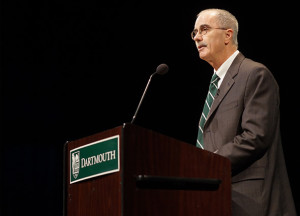On January 29, President Phil Hanlon announced the long-awaited “Moving Dartmouth Forward” (MDF) recommendations provided by the Steering Committee to a packed Moore Auditorium in the Hopkins Center. In the spring of 2014, Hanlon had proclaimed the conception of this committee, which consisted of students and faculty working to fulfill Hanlon’s goal of eliminating high-risk drinking, sexual assault, and “exclusivity” on campus. With the nine-month gestation period over, the MDF team’s ideas saw their parturition in the President’s address. Hanlon began by invoking the name of John Kemeny, who had presided over a period of sweeping change at the College—the transition to a co-educational system and the unforgettable creation of the BASIC computer language—and pledged to similarly maintain the “incredible promise that is Dartmouth” by putting a halt to “extreme behaviors” and increasing “inclusivity.”
Hanlon’s first portion focused on “fundamentally transform[ing] residential life.” He plans to have a new “residential community” system ready by the fall of 2016. For their four-year tenure at Dartmouth, students will be assigned one of six clusters, which will have dedicated professors, graduate students, and events. Hanlon mentioned a one-million-dollar per year investment in hiring more diverse faculty that had been announced in the fall; a similar approach will take place with “new strategies to recruit a broad socio-economic demographic of undergraduate students.”
Hard alcohol is apparently not included in President Hanlon’s vision of residential life, as undergraduate students are now prohibited from owning or drinking such liquors on campus; they are also declared verboten from College-sponsored events. This ban has been seen as the flagship reform of “Moving Dartmouth Forward,” and appears to be the most controversial of the Steering Committee’s ideas, as it will apply to all undergraduate students on campus, regardless of their age.
Continuing his train of thought on “extreme behavior,” Hanlon mentioned the precedent set by the zero-tolerance sexual assault disciplinary policy announced in June and a new bystander education program, which find spiritual continuation in a four-year sexual assault awareness program and a smartphone safety app. Other behaviors will be regulated by a student code of conduct, which students will be required to sign starting next year. One interesting aspect of the new code is the Internet; perhaps alluding to the Bored@Baker scandal last year, Hanlon observed, “Our expectation is that students of Dartmouth act with the same integrity in the shadow of the Internet as they would in the light of day.”
Regardless of the focus on “extreme behavior,” however, President Hanlon did not, as some protesters agitated for, abolish the Greek system, noting that other schools with and without fraternities all “struggle with high levels of harmful behaviors.” Praising the Greek Leadership Council for proposing reforms (such as eliminating pledge term, having male and female faculty advisors for each house, increased financial aid, etc.) this fall, Hanlon hoped that steps forward would lead to a “respectful and inclusive” environment. Dean of the College Inge-Lise Ameer will be in charge of assembling an annual review process for these reforms. “Moving forward, it will be simple. Organizations that choose not to fulfill these higher standards [of respect and inclusivity] will not be a part of our community.”
The last part of Hanlon’s speech touched on “academic rigor”—a mildly unexpected move, considering that his rhetoric over the last few months on MDF had usually been in the context of the aforementioned issues of “extreme behaviors” and “exclusivity.” Hanlon’s vision of a “more vigorous academic environment” includes holding class around Homecoming, Winter Carnival, and Green Key; grade deflation; and classes starting at eight on Tuesdays and Thursdays. He also announced a “major investment to expand experiential learning” in the Dartmouth Center for the Advancement of Learning (DCAL).
President Hanlon finished his list of reforms with the announcement of an “external Oversight Committee to be chaired by Tufts President Emeritus Larry Bacow.” Campus climate surveys will be conducted in the upcoming spring and fall terms. Hanlon pledged to be “transparent about our progress on all fronts” and “retool these steps as needed to reach our end goal.”
Only time will tell if President Hanlon’s future sight will prove to be prescient, or whether these reforms will, time after time, spiral downwards to the ash heap of history.


Be the first to comment on "Moving Dartmouth Forward: The Substance"